Tokyo, October 2nd, 2019 - Nomura Research Institute, Ltd. (NRI) in their book Digital Capitalism (Toyo Keizai Inc.: May 2018) measured the economic effects of digitalization, which could not be understood with conventional frameworks such as GDP, by considering consumer surplus to be the benefit received by the consumer (see ref. 1). NRI is researching the economic and social impacts of digitalization and is announcing the results of its estimation of the consumer surplus generated by digitalization, as well as proposing new economic indicators and regional revitalization initiatives for the digital era.
Japanese consumer surplus from digital services is 161 trillion JPY per year
Based on an econometric model 1 developed by Prof. Brynjolfsson, MIT, NRI estimates the total consumer surplus in Japan from digital services (both paid and free) to be 161 trillion JPY per year (2016). This amount represents approximately 30% of the real GDP (520 trillion JPY) of Japan in 2016, and it has become clear that the consumer surplus is not negligible in any economic activity. The major social networking sites (LINE, Facebook, Twitter, Instagram) were estimated to produce a consumer surplus of 20 trillion JPY per year in Japan.
Consumer surplus generated by digital services (both paid and free) and GDP (Japan)
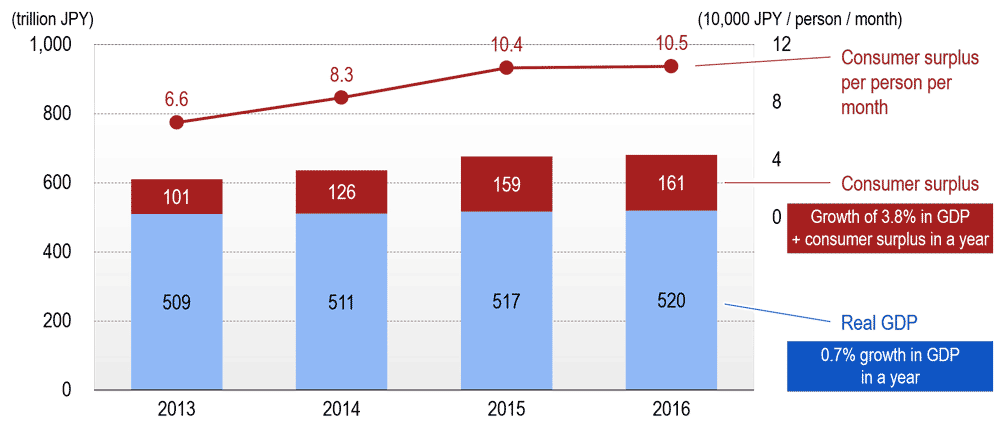
Source: Joint study conducted by NRI and Rotterdam School of Management (2018)
Consumer surplus generated by major social networking sites (Japan) 2
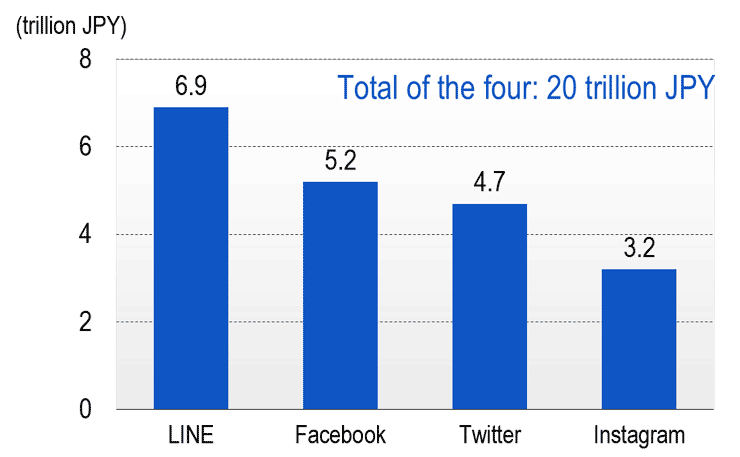
Source: Consumer Internet Survey by NRI (2019)
Economic indicators for the digital era: "GDP+i" and "DCI"
The NRI survey revealed that, while major economic indicators such as the real GDP growth rate and the prescribed wage level have been sluggish since 2006 in Japan, people’s subjective sense of quality of life has been improving (see ref. 2). NRI believes that the benefits obtained from digital services (consumer surplus generated by digitalization) is behind this conflicting phenomenon, and proposes the new indicators “GDP+i", which better represents the economic activity of the digital era 3 , and “DCI”, which represents the progress in the digitalization of society.
- GDP+i : The consumer surplus generated by digitalization is an imaginary value i that cannot be represented as an actual amount. Here, NRI proposes the numerical value "GDP+i", which is the sum of this number and the GDP, as a new economic indicator for the digital era, and recommends that analysis of economic activities include consumer surplus.
Japan’s “GDP+i” trends (2013-2016)
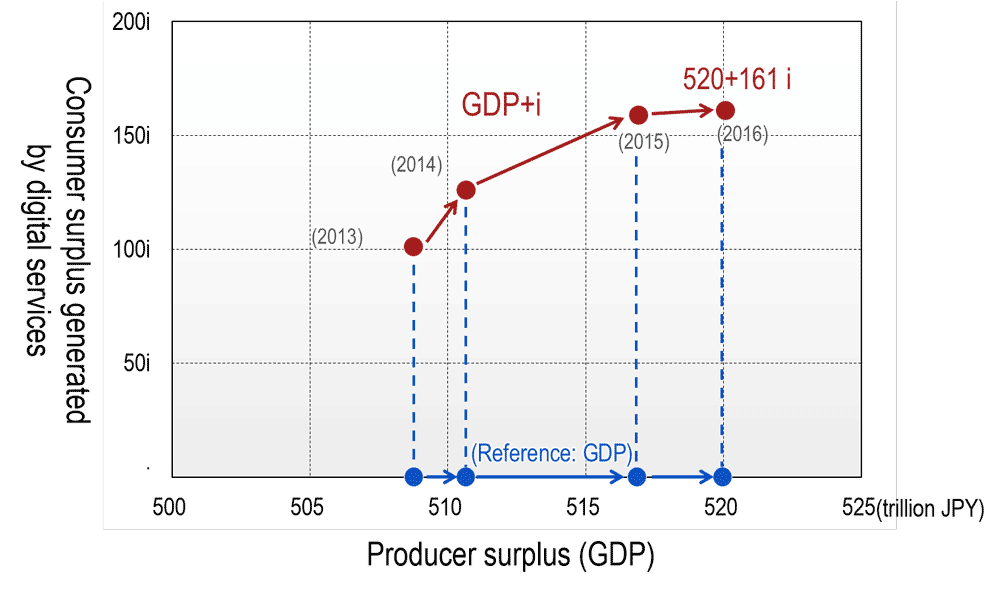
- DCI (Digital Capability Index) : In the European Union, it has become clear that DESI (Digital Economy and Society Index), which indicates the progress of member countries towards economic and social digitalization, is highly correlated with the life satisfaction of citizens (see ref. 3). NRI believes that the consumer surplus generated by digital services has improved subjective wellbeing in Japan. In order to measure the true affluence of society, we have developed a Japanese version of DESI called DCI, applying it among regions in Japan. It combines numerical values indicating the progress of digitization, assigning weights in the order of correlation with life satisfaction, and indexing the maximum value as 100, thereby showing the capabilities of citizens to use digital technologies to increase their life satisfaction. According to NRI's estimates for 31 prefectures in Japan, the correlation between the prefectures’ DCI and life satisfaction is higher than the correlation between their average earnings and life satisfaction. In particular, the impact of Digital Public Services on life satisfaction is estimated to be as large as that of Use of Internet. For this reason, NRI believes that Digital Government centered on “My Number” initiatives should soon be established in Japan.
Structure of DCI (Digital Capability Index: DESI’s Japanese version) *Numerical values in parentheses are weights 4

Correlation of life satisfaction by prefecture in Japan with per capita prefectural income and DCI
5
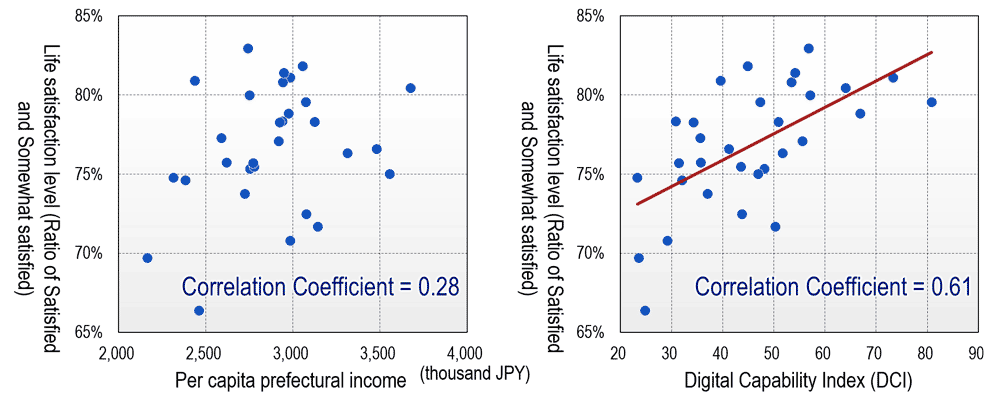
Source: Life satisfaction: "Lifestyle Questionnaire" (2018), NRI; Per capita prefectural income: “Prefectural economic calculation”, Cabinet Office
Regional revitalization initiatives in the digital era
In order to realize regional digital governments, it is important to develop public and private data (digital social infrastructure) created by the main parties (citizens, governments, companies, and academic institutions) of cities and regions. In particular, municipalities with a population of about 100,000 that have citizens, authorities, companies, and academic institutions as promotors of innovation and that can efficiently develop and operate the information infrastructure necessary for civil services, and especially those that can be considered as Glocal Hubs
6
for their high productivity, should take the lead to realize regional digital governments. The potential of local governments to realize digital government can be understood from the results of NRI's survey, which indicate that municipalities are the most reliable users of personal information.
This time, NRI will be working with Tsuruoka City, which has the potential of being a glocal hub, on a new initiative of regional revitalization in the digital era to support activities related to digitalization and regional revitalization. We will continue to support the realization of national and regional digital governments from our own perspectives and knowledge, including the announcement of "Digital Potential City Ranking (tentative name)" for cities throughout Japan and support for the digitalization of glocal hubs.
Q. When you provide your personal information, do you feel that it is being used effectively?
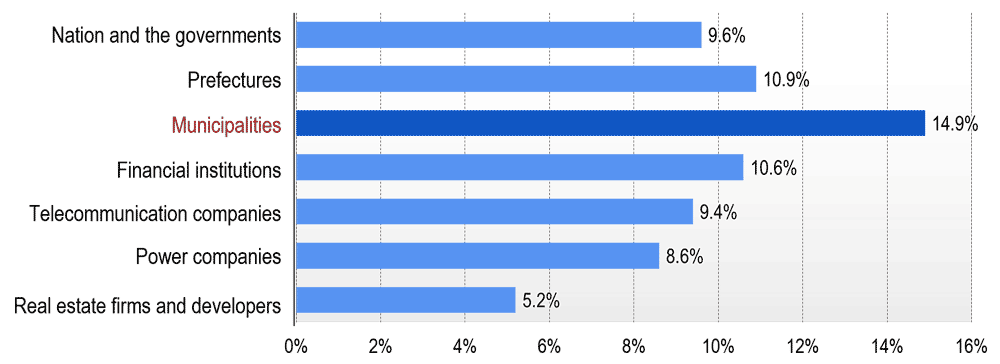
Source: NRI’s Digital Life Survey (August 2019)
-
1
“The Attention Economy: Measuring the Value of Free Digital Services on the Internet” Erik Brynjolfsson, Joo Hee Oh, 2012
-
2
Calculated by taking the average value of WTP (Willingness To Pay) and WTA (Willingness To Accept) obtained from the survey as the willingness to pay per user and multiplying by the number of active users.
-
3
We are greatly inspired by the MIT research team, who proposes “GDP-B”, which takes consumer surplus into account and add it to GDP. For GDP-B, please see “GDP-B: Accounting for the Value of New and Free Goods in the Digital Economy” Erik Brynjolfsson et. al. March 2019.
-
4
The weights are set based on the size of the correlation coefficient between each item and level of life satisfaction (NRI’s Survey of 10,000 Consumers)
-
5
In the correlation analysis, 31 prefectures with 100 or more response samples in NRI’s Survey of 10,000 Consumers (2018) were considered for analysis.
Tokyo Metropolis has not been plotted in the above graph to calculate per capita prefectural income. -
6
A city that, regardless of its population size, can reliably achieve high productivity at the city level while maintaining direct contact with the global market, centering on powerful companies and academic research institutions specializing in R&D.
References
-
1:
Consumer surplus refers to the difference between the price that consumers pay and the price that they are willing to pay to procure a product or service. In other words, it gives them a sense that they have obtained a bargain.
-
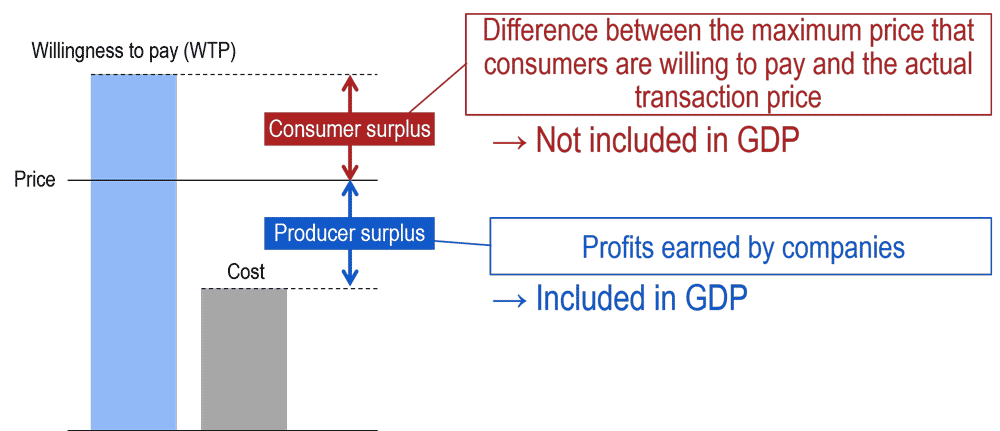
-
2:
Trends of “Awareness about own standard of living as seen from the global perspective”
-
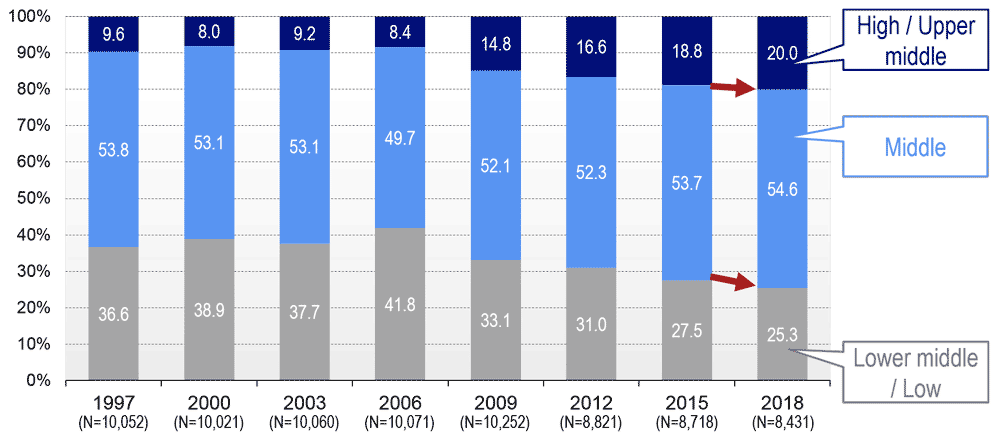
Source: NRI’s Survey of 10,000 Consumers (1997-2018). The cases of ‘No answer’ have not been included in the above graph.
-
3:
The correlation between DESI (Digital Economy and Society Index) of major EU countries and life satisfaction is as follows.
DESI of major EU countries: 2019 estimation
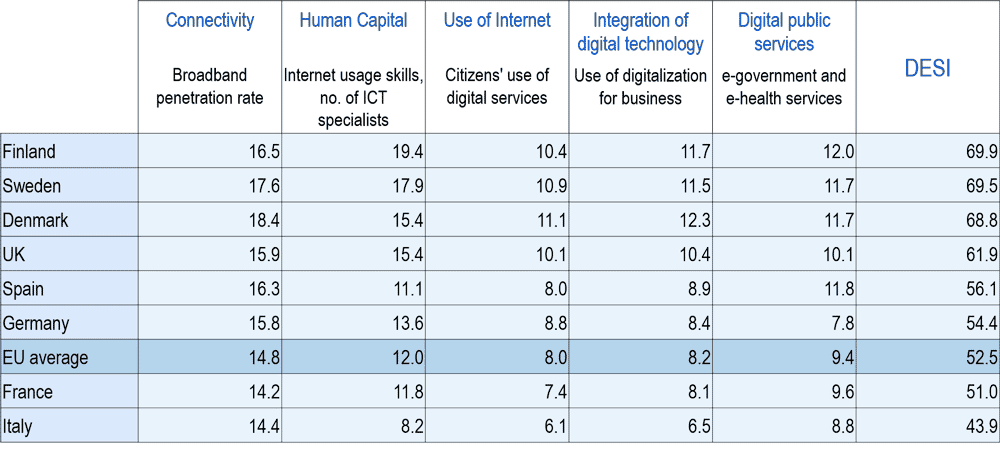
Source: DESI (2019), European Commission
Life satisfaction and DESI of EU countries
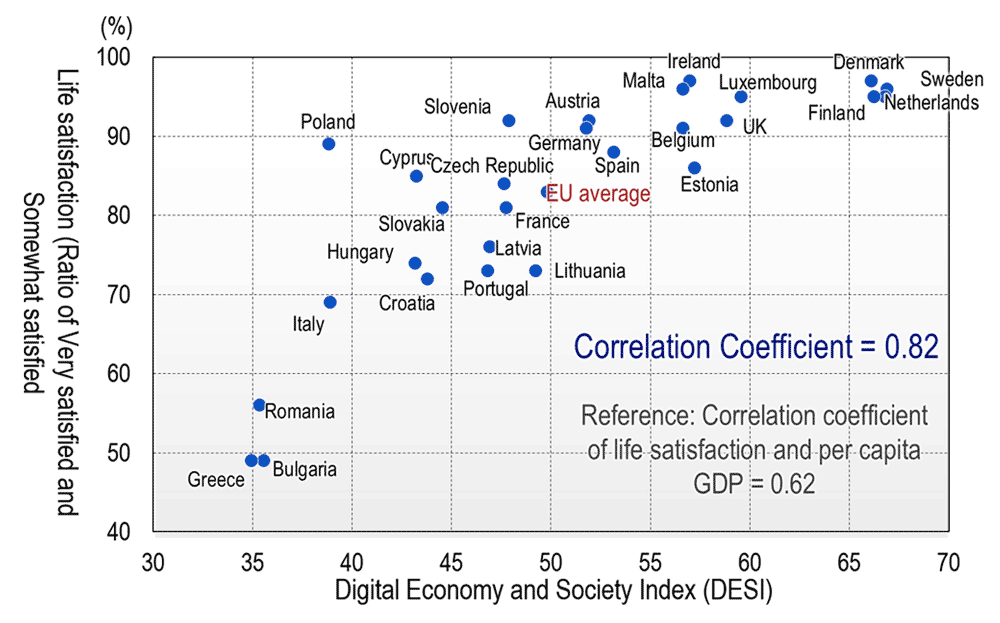
Source: Lifestyle Satisfaction - European Commission Eurobarometer (2018), Digital Economy and Society Index - DESI (2018), European Commission
-
4:
Summary of the cited survey (completely performed by NRI)
| Consumer Internet Survey | Survey of 10,000 Consumers | Digital Life Survey | |
| Survey period | July 2019 | July to August 2018 | August to September 2019 |
| Survey target | Men and women aged 15 or older nationwide | Men and women aged 15 to 79 nationwide | Men and women aged 20 or older nationwide |
| Valid responses | 3,600 | 10,065 | 7,601 |
About Nomura Research Institute (NRI)
Founded in 1965, NRI is a leading global provider of system solutions and consulting services, including management consulting, system integration, and IT management and solutions for financial, manufacturing, retail and service industries. Clients partner with NRI to expand businesses, design corporate structures and create new business strategies. NRI has about 12,000 employees in more than 40 offices globally including New York, London, Tokyo, Hong Kong, Singapore, and Australia. NRI reports annual sales above $4.5 billion.
For more information, visit
https://www.nri.com/en
Inquiries
Media Inquiries:
Sangi Tamaoka, Lawrence Hale Sterling
Nomura Research Institute, Inc.
TEL: +81-3-5877-7100
E-mail:
kouhou@nri.co.jp